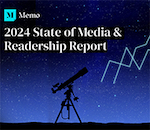New York Times public editor Margaret Sullivan, responding to the "furor" of reader email comments on Israel/Palestine "that has practically burned through the screen," devoted a full page Nov. 23 to answering such critics.
 Sullivan says NYT editors are also concerned about a "situation in which so many readers mistrust their motives and their efforts, and in which charges of bias and cries of 'shame on you' come unrelenting from both sides."
Sullivan says NYT editors are also concerned about a "situation in which so many readers mistrust their motives and their efforts, and in which charges of bias and cries of 'shame on you' come unrelenting from both sides."
She interviewed international editor Joseph Kahn, asking what can be done about readers who demand that violence by one side be "matched" with violence by the other side.
Kahn said he gets "a lot" of such complaints in which NYT is "asked to be partisans and we're not partisans. We're genuinely not. If telling the entire history of the conflict from a partisan point of view is the metric, we're going to fail every time."
FAIR Faults Sullivan
Fairness & Accuracy in Reporting thought there was "remarkably little criticism" of NYT in the article, saying that Sulllivan appears to be "intimidated" by the onslaught of complaints.
FAIR's Jim Naureckas says obsession with "symmetry" leads NYT to report "Rockets from Gaza to Israel" as totaling 2,927 and "Targets in Gaza struck by Israel" as 3,834. There is no comparison between the mostly ineffectual rockets from Gaza and the Israeli military bombardment that killed more than 2,100 in Gaza, he says.
The difficulty of covering the Israel/Gaza conflict was also described by Sherine Tadros in HuffPost/WorldPost.
A common complaint, says Sullivan, is that NYT simply devotes too much space to Israel/Palestine.
"Israel is one of the most important allies of the U.S.—one to which it provided more than $3 billion in military aid last year—and that its activities are of great interest to NYT readers," she wrote.
She feels that the paper "does everything it can to be fair in its coverage and generally succeeds." She calls NYT reporting "solid and excellent" and that its reporters are "serious, smart and thoughtful" but also sees "room for improvement."
Bureau in West Bank Urged
She supports an NYT bureau in Ramalla, the administrative capital of Palestine, which is in the West Bank ten miles north of Jerusalem, noting this had also been recommended by previous NYT public editor Daniel Korent.
However, Kahn told her that "practical problems and expenses continue to make that unlikely."
"There should be a native Arabic speaker on staff who can penetrate Palestinian society with understanding and solid news judgment," said Sullivan. Kahn told her he is working on that.
NYT at one time "went out of its way not to assign Jewish staff members to the Jerusalem bureau; that, appropriately, has not been the case for decades," she writes.
Critics noted that Ethan Bronner, former bureau chief, had a son who was in the Israeli military and asked that he be relieved of that post. The request was rejected. Isabel Kershner, an NYT contract writer, has a son who has begun military training and whose husband once worked for an Israeli think tank, Sullivan noted.
Another recommendation is that NYT "stop straining for symmetry. In headlines, in side by side photos, in photo galleries, the Times sometimes looks like it is running scared."
Concludes Sullivan: "With the situation so polarized and no visible movement toward peaceful resolution, all the Times journalists can do is play it fairly and straightforwardly as possible, both in covering the news and in engaging honestly and openly with their readers."


 Trump Media & Technology Group today reported a $58.2M net loss on $4.1M in 2023 revenues, a disclosure that drove its stock price down 22.6 percent to $47.96.
Trump Media & Technology Group today reported a $58.2M net loss on $4.1M in 2023 revenues, a disclosure that drove its stock price down 22.6 percent to $47.96. Barry Pollack, an attorney at Wall Street’s Harris St. Laurent & Wechsler, has registered Julian Assange as a client with the Justice Dept. “out of an abundance of caution.”
Barry Pollack, an attorney at Wall Street’s Harris St. Laurent & Wechsler, has registered Julian Assange as a client with the Justice Dept. “out of an abundance of caution.” Paramount Global to slash 800 jobs in what chief executive Bob Bakish calls part of an effort to “return the company to earnings growth"... Rolling Stone editor-in-chief Noah Shachtman is exiting at the end of the month due to disagreements with chief executive Gus Wenner over the direction the magazine is taking... The New York Times broke the $1 billion barrier in annual revenue from digital subscriptions in 2023... Press Forward is investing more than $500 million to strengthen local newsrooms.
Paramount Global to slash 800 jobs in what chief executive Bob Bakish calls part of an effort to “return the company to earnings growth"... Rolling Stone editor-in-chief Noah Shachtman is exiting at the end of the month due to disagreements with chief executive Gus Wenner over the direction the magazine is taking... The New York Times broke the $1 billion barrier in annual revenue from digital subscriptions in 2023... Press Forward is investing more than $500 million to strengthen local newsrooms. The majority of news articles are read within the first three days of publication, according to a recent report.
The majority of news articles are read within the first three days of publication, according to a recent report. The Los Angeles Times gives pink slips to 115 people or 20 percent of its newsroom staff... TIME is also laying off about 30 employees, which is approximately 15 percent of its editorial staff... The Baltimore Banner, which was launched by Stewart Bainum in 2022 after he failed to buy the Baltimore Sun, added 500 subscribers per day in the three days following Sinclair Broadcast Group's deal to purchase the Sun.
The Los Angeles Times gives pink slips to 115 people or 20 percent of its newsroom staff... TIME is also laying off about 30 employees, which is approximately 15 percent of its editorial staff... The Baltimore Banner, which was launched by Stewart Bainum in 2022 after he failed to buy the Baltimore Sun, added 500 subscribers per day in the three days following Sinclair Broadcast Group's deal to purchase the Sun.


 Have a comment? Send it to
Have a comment? Send it to 
No comments have been submitted for this story yet.